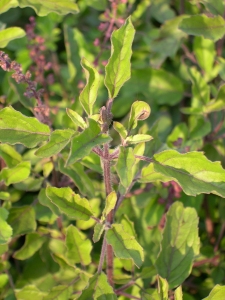Medhya Rasayana – Mental Rejuvenation
In Ayurveda, herbs that rejuvenate the mind and nervous system are known as medhya rasayanas. In Western herbalism, many of these herbs are classified as nervines. Medhya rasayana herbs help to calm the mind, relax the body, and even replenish and regenerate the nervous system. These herbs are great allies against the oxidizing effects of stress and the depletion of our vital energy and immunity. Some are heavy, grounding and sedating like valerian, hops, poppy or kava kava. Others are still calming, yet have lighter energy such as passion flower, gotu kola or skullcap. Nourishing tonic herbs, most notably ashwagandha, also have calming qualities, but can also provide strength and energy where and when needed.
Herbs are Broad Spectrum
It can often be hard to make a clear distinction between one category of herbs and another, since a single herb can possess several actions. For instance, I have frequently given laxative herbs to promote intestinal cleansing, and the person will report back that they are sleeping better and thinking clearer. This shows the connection between our digestive function, the mind, immune system and so on, because all our bodily systems work as a whole.
For example, herbs that clear excess heat and toxins from the liver like bhringraj (eclipta alba), brahmi (gotu kola and bacopa monnieri) also have properties that are seen to improve mental function. Others like dandelion leaf of punarnava help to clear heat from the liver as well as through the urinary system. So when creating an herbal blend, you might select a few herbs that not only target the nervous system, but also improve digestion, elimination, and so on.
Agni (Digestive Fire) and the MInd
Before I talk further about herbs help the mind and nervous system, lets take a closer look at the concept of agni, digestive fire. The main type of agni is situated in the stomach as jathara agni, and is responsible for breaking down the food stuff into the food precursors (ahara rasa). Agni is also present in the liver as bhuta agni, the digestive energy that breaks down the five elements in our food, making them usable in the formation of the bodily tissues. There are also specialized forms of agni present in every tissue and cell in the body. When any of the various aspects of agni are out of balance, ama (metabolic wastes) can accumulate in the body. As ama accumulates in the body, it disrupts the function of the internal organs and can greatly effect how we feel on a mental and emotional level.
Liver and Emotions
If the liver becomes toxic, it can cause emotional instability and leave one feeling irritable and agitated. The liver is a major filter for toxins, and when it is clogged or sluggish, symptoms might include diminished desires and zest for life, brain fog, moodiness, anger, poor digestion, weight gain and fatigue.
To gain the most benefit from mental rejuvenative herbs, it helps to first cleanse impurities from the liver and blood. Many of these liver specific herbs are also great rejuvenators to the mind. One of my favorite nervines herbs for this is gotu kola, which has gentle blood purifying as well and nervine properties.. Others include bhringraj (eclipta alba), jatamansi, and skullcap. Stronger liver cleansers include neem, milk thistle, Oregon grape root, barberry, yellow dock and shanka pushpi can also be employed for a deeper cleansing action.
Some herbs that assist liver energy are also nourishing tonics. I especially like these herbs for ongoing care. Herbs like shatavari and ashwagandha help to gently cleanse the liver and blood, while also acting as nutritive tonics to the bodily tissues. If someone is weak or deficient, but still needs some liver support, I often use herbs like shatavari, gotu kola, red clover, or burdock root. Licorice root is also sweet, nourishing, and anti-inflammatory.
Getting Organ Specific
We can also use herbs that have a specific affinity to a particular organ to help release mental and emotional stress form that area. For example, if there is deep-seated grief and sadness in the lungs, herbs like as tulsi or vacha (calamus root), both having decongestant as well as nervine properties, can aid in releasing the trapped emotions. This approach can also be used for any organ. For the heart we can use Hawthorne berry, arjuna, or pushkarmool (elecampane) to warm and open the heart center along with herbs that increase our awareness of what surfaces from the unconscious mind. Below are a few formulas that act on specific organs and their related emotional energies.
Heart Opening Formula:
Hawthorne berry 3 parts
Arjuna 2 parts
Brahmi 3 parts
Cardamom ½ part
Cinnamon 1 part
Lung Opening Formula:
Tulsi 3 parts
Vacha (Calamus) 2 parts
Fennel 2 part
Mint- 1 part
Ginger 1 part
Liver Calming
Burdock root 4 parts
Red clover 2 parts
Gotu kola 3 parts
Skullcap 3 parts
Oats straw 3 parts
Chamomile 2 parts
Rose petals 1 part
The above formulas are just simple ways we can explore with mental rejuvenative and other supportive herbs to direct there energy. You can start with these formulas or create your own, by adding herbs to suit your individual needs.

